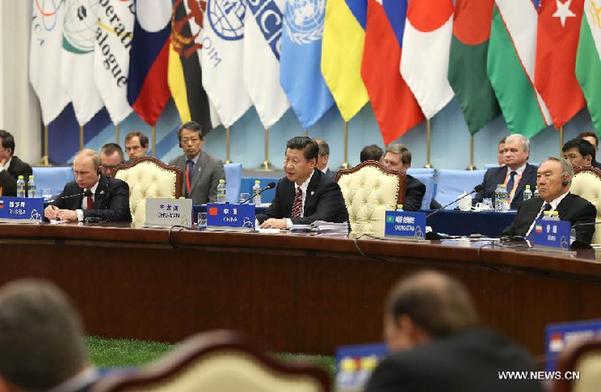New Asian security concept for new progress in security cooperation
 0 Comment(s)
0 Comment(s) Print
Print E-mail China.org.cn, May 28, 2014
E-mail China.org.cn, May 28, 2014
Remarks at the Fourth Summit of the Conference on Interaction and Confidence Building Measures in Asia
By H.E. Xi Jinping President of the People's Republic of China
Shanghai Expo Center, 21 May 2014
|
|
|
Chinese President Xi Jinping (C) speaks during the fourth summit of the Conference on Interaction and Confidence Building Measures in Asia (CICA), in Shanghai, east China, May 21, 2014. [Xinhua] |
Distinguished Guests, Colleagues, Friends, Ladies and Gentlemen,
I would like to thank Foreign Minister Ahmet Davutoglu, the Special Representative of the Turkish President, for his remarks. China has assumed the chairmanship of the Conference on Interaction and Confidence Building Measures in Asia (CICA), so please allow me to take this opportunity to express heartfelt thanks to all sides, in particular Kazakhstan, the initiator of CICA, and Turkey, the previous chair of CICA, for your trust and support.
Now, let me make some remarks on behalf of the People's Republic of China.
The summit today has brought together leaders and representatives from 47 countries and international organizations, including CICA member states, observers and invited guests of the Shanghai summit. Under the theme "Enhancing Dialogue, Trust and Coordination for a New Asia of Peace, Stability and Cooperation", we will discuss the important subject of security cooperation, explore policies for long-term peace and stability, and jointly promote development and prosperity. As such, this summit is of great importance to security in Asia and the world at large and will have far-reaching impacts.
Asia today is home to 67% of the world's population and accounts for one third of the global economy. It is a place where diverse civilizations and nations meet and interact. Peace and development of Asia is closely connected with the future of mankind, and Asia's stability and revival is a blessing to peace and development of the world.
Asia today, though facing more risks and challenges, is still the most dynamic and promising region in the world. Peace, development and win-win cooperation are the main trend in the region, and countries in the region generally prefer policies that address differences and disputes through consultation and negotiation. Asia enjoys a rising status in the international strategic landscape and plays an increasingly important role in promoting a multi-polar world and democracy in international relations. Such a sound situation in the region has not come easily and ought to be doubly cherished.
Asia today is witnessing vibrant cooperation in the economic field. Cooperation in the security field is making progress despite difficulties, and various cooperation mechanisms are more dynamic. Asia has come to a crucial stage in security cooperation where we need to build on the past achievements and strive for new progress.
As a Chinese saying goes, "A wise man changes as time and circumstances change." We need to keep pace with the changing circumstances and evolving times. One cannot live in the 21st century with the outdated thinking from the age of Cold War and zero-sum game. We believe that it is necessary to advocate common, comprehensive, cooperative and sustainable security in Asia. We need to innovate our security concept, establish a new regional security cooperation architecture, and jointly build a road for security of Asia that is shared by and win-win to all.
Common security means respecting and ensuring the security of each and every country. Asia is a region of great diversity. Countries differ in size, wealth and strength. They vary in historical and cultural traditions as well as social systems, and have different security interests and aspirations. However, we all live in the same Asian family. With our interests and security so closely intertwined, we will swim or sink together and we are increasingly becoming a community of common destiny.
Security must be universal. We cannot just have the security of one or some countries while leaving the rest insecure, still less should one seek the so-called absolute security of itself at the expense of the security of others. Otherwise, just as a Kazakh proverb aptly puts it, "One who tries to blow out other's oil lamp will get his beard on fire."
Security must be equal. Every country has the equal right to participate in the security affairs of the region as well as the responsibility of upholding regional security. No country should attempt to dominate regional security affairs or infringe upon the legitimate rights and interests of other countries.
Security must be inclusive. We should turn Asia's diversity and the differences among Asian countries into the energy and driving force for regional security cooperation. We should abide by the basic norms governing international relations such as respecting sovereignty, independence and territorial integrity and non-interference in internal affairs, respect the social systems and development paths chosen by countries on their own, and fully respect and accommodate the legitimate security concerns of all parties. To beef up and entrench a military alliance targeted at a third party is not conducive to maintaining common security.
Comprehensive security means upholding security in both traditional and non-traditional fields. Asia's security challenges are extremely complicated, which include both hotspot and sensitive issues and ethnic and religious problems. The challenges brought by terrorism, transnational crimes, environmental security, cyber security, energy and resource security and major natural disasters are clearly on the rise. Traditional and non-traditional security threats are interwoven. Security is a growing issue in both scope and implication.
We should take into full account the historical background and reality of Asia's security issues, adopt a multi-pronged and holistic approach, and enhance regional security governance in a coordinated way. While tackling the immediate security challenges facing the region, we should also make plans for addressing potential security threats, and avoid a fragmented and palliative approach that only treats the symptoms.







Go to Forum >>0 Comment(s)